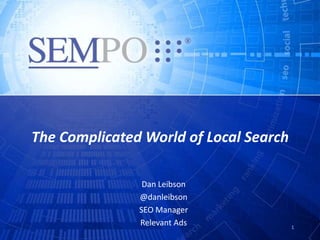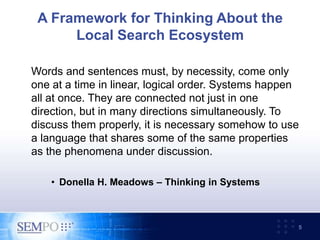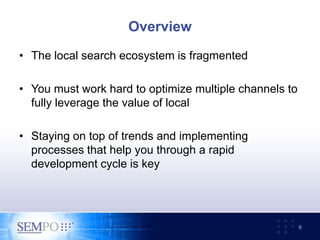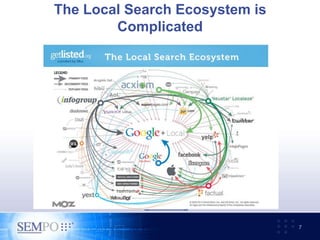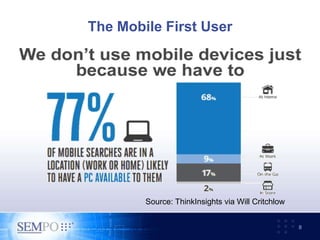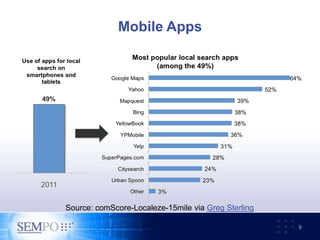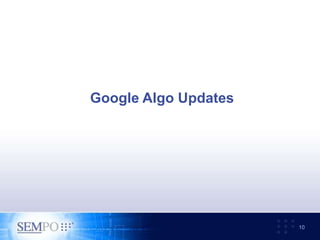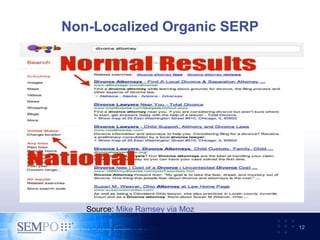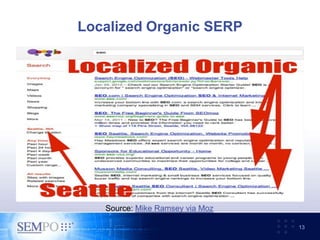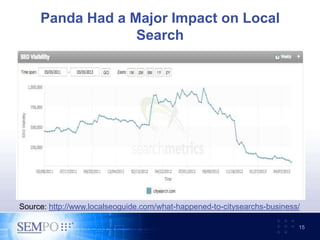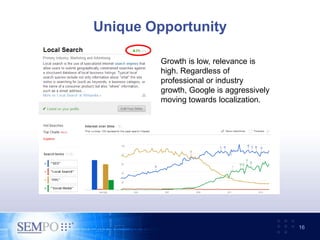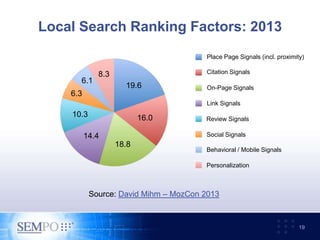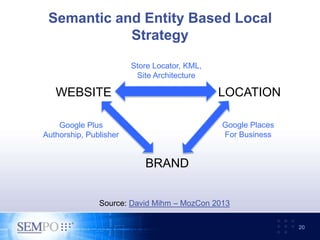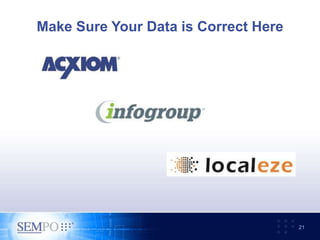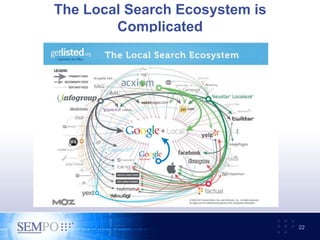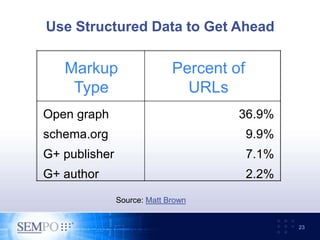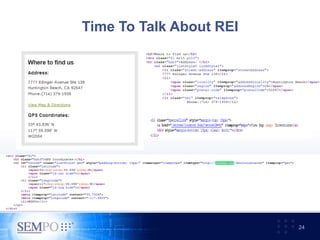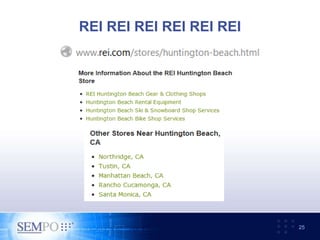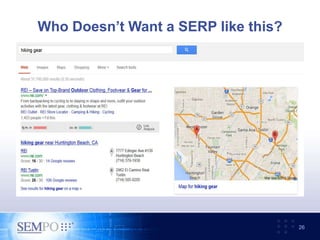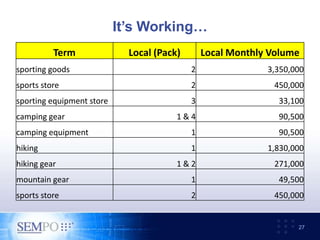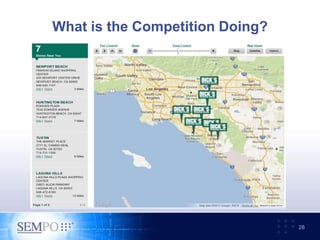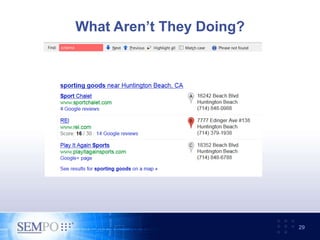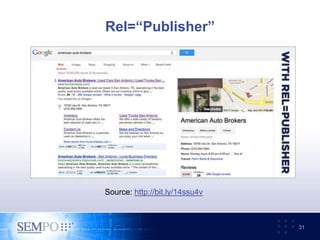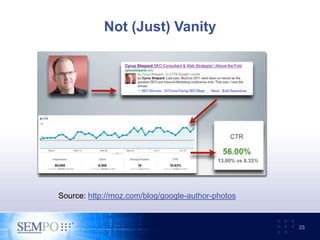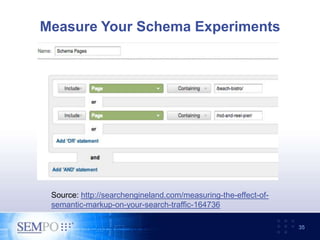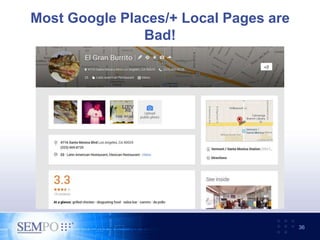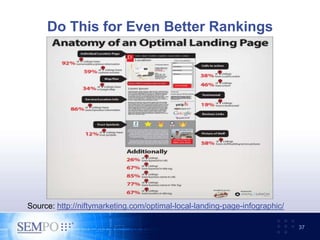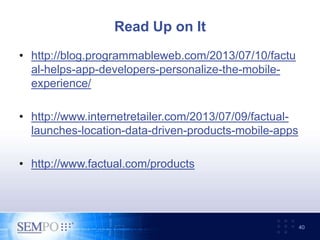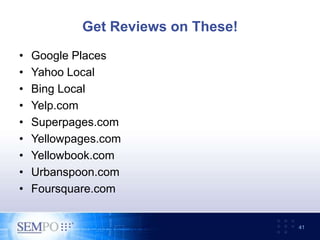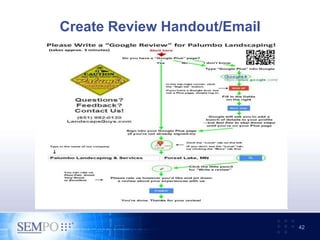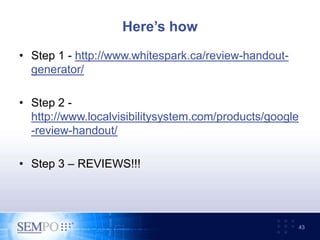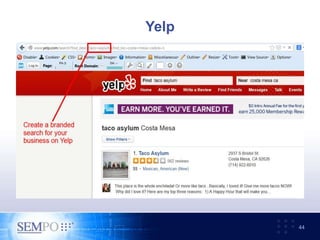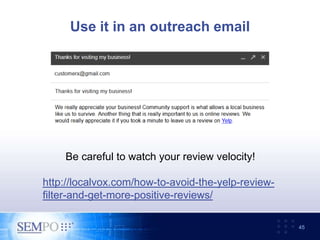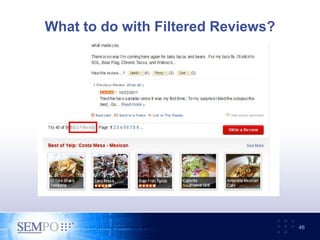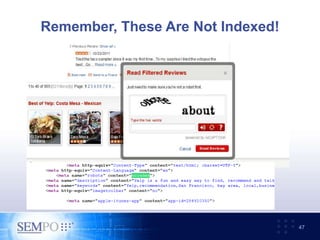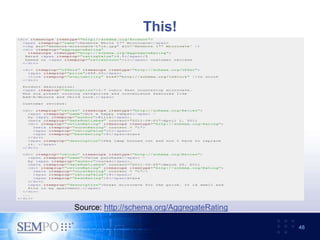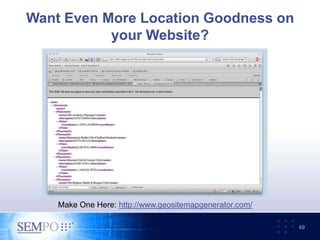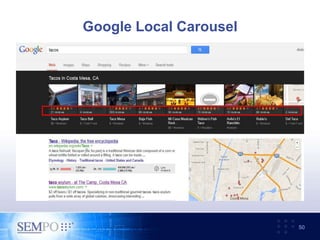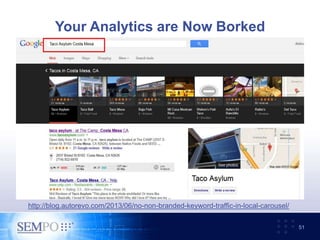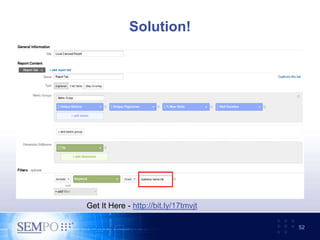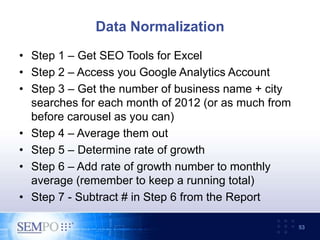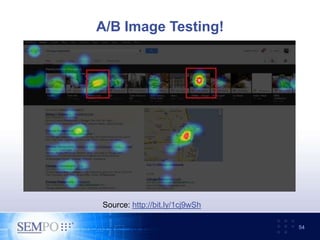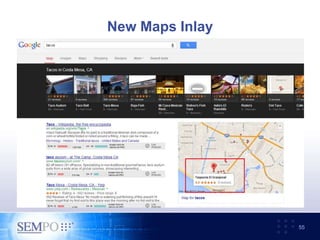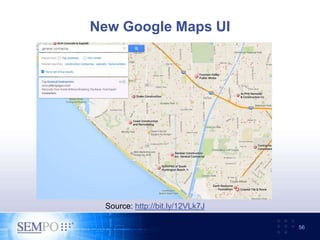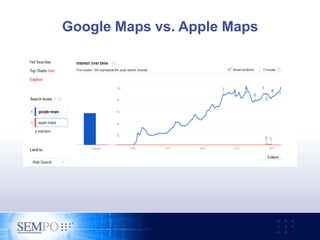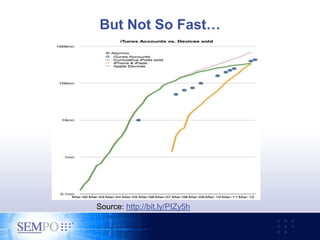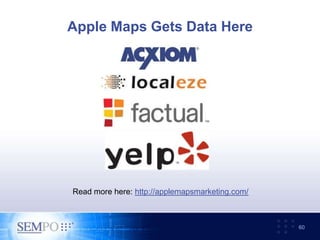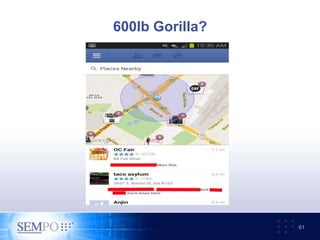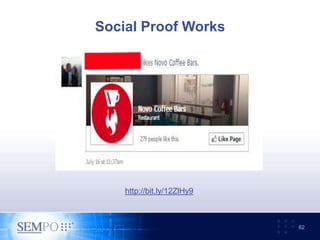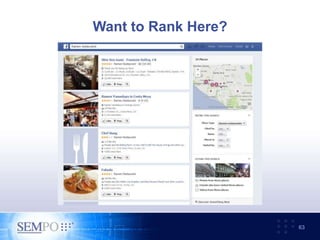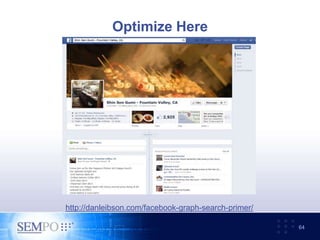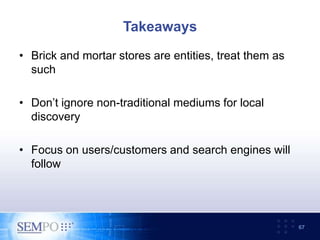The Complicated World of Local Search
- 1. The Complicated World of Local Search Dan Leibson @danleibson SEO Manager Relevant Ads 1
- 2. Reasons You Should Belong to SEMPO • Expand Your Knowledge • Engage With Industry Leaders • Maximize Your Career Growth • Grow Your Business • Save Money
- 4. Housekeeping
- 5. A Framework for Thinking About the Local Search Ecosystem Words and sentences must, by necessity, come only one at a time in linear, logical order. Systems happen all at once. They are connected not just in one direction, but in many directions simultaneously. To discuss them properly, it is necessary somehow to use a language that shares some of the same properties as the phenomena under discussion. • Donella H. Meadows – Thinking in Systems 5
- 6. Overview • The local search ecosystem is fragmented • You must work hard to optimize multiple channels to fully leverage the value of local • Staying on top of trends and implementing processes that help you through a rapid development cycle is key 6
- 7. The Local Search Ecosystem is Complicated 7 Source: getlisted.org
- 8. The Mobile First User 8 Source: ThinkInsights via Will Critchlow
- 9. Mobile Apps 9 Source: comScore-Localeze-15mile via Greg Sterling
- 12. Non-Localized Organic SERP 12 Source: Mike Ramsey via Moz
- 13. Localized Organic SERP 13 Source: Mike Ramsey via Moz
- 15. Panda Had a Major Impact on Local Search 15 Source: http://www.localseoguide.com/what-happened-to-citysearchs-business/
- 16. Unique Opportunity 16 Growth is low, relevance is high. Regardless of professional or industry growth, Google is aggressively moving towards localization.
- 17. 17 Source
- 18. Time to Get Down and Dirty 18 Source: Flickr
- 19. Local Search Ranking Factors: 2013 19 Place Page Signals (incl. proximity) Citation Signals On-Page Signals Link Signals Review Signals Social Signals Behavioral / Mobile Signals Personalization 19.6 16.0 18.8 14.4 10.3 6.3 6.1 8.3 Source: David Mihm – MozCon 2013
- 20. Semantic and Entity Based Local Strategy 20 BRAND WEBSITE LOCATION Store Locator, KML, Site Architecture Google Places For Business Google Plus Authorship, Publisher Source: David Mihm – MozCon 2013
- 21. Make Sure Your Data is Correct Here 21
- 22. The Local Search Ecosystem is Complicated 22
- 23. Use Structured Data to Get Ahead 23 Open graph 36.9% schema.org 9.9% G+ publisher 7.1% G+ author 2.2% Markup Type Percent of URLs Source: Matt Brown
- 24. Time To Talk About REI 24
- 25. REI REI REI REI REI REI 25
- 26. Who Doesn’t Want a SERP like this? 26
- 27. It’s Working… Term Local (Pack) Local Monthly Volume sporting goods 2 3,350,000 sports store 2 450,000 sporting equipment store 3 33,100 camping gear 1 & 4 90,500 camping equipment 1 90,500 hiking 1 1,830,000 hiking gear 1 & 2 271,000 mountain gear 1 49,500 sports store 2 450,000 27
- 28. What is the Competition Doing? 28
- 29. What Aren’t They Doing? 29
- 30. Don’t be a 30
- 33. Not (Just) Vanity 33 Source: http://moz.com/blog/google-author-photos
- 34. Magna Carta Holy Grail 34
- 35. Measure Your Schema Experiments 35 Source: http://searchengineland.com/measuring-the-effect-of- semantic-markup-on-your-search-traffic-164736
- 36. Most Google Places/+ Local Pages are Bad! 36
- 37. Do This for Even Better Rankings 37 Source: http://niftymarketing.com/optimal-local-landing-page-infographic/
- 38. Want to Rank Here? 38 Source: Flickr
- 39. Distribute Data Here 39 IT’S FREE!!!!!!
- 40. Read Up on It • http://blog.programmableweb.com/2013/07/10/factu al-helps-app-developers-personalize-the-mobile- experience/ • http://www.internetretailer.com/2013/07/09/factual- launches-location-data-driven-products-mobile-apps • http://www.factual.com/products 40
- 41. Get Reviews on These! • Google Places • Yahoo Local • Bing Local • Yelp.com • Superpages.com • Yellowpages.com • Yellowbook.com • Urbanspoon.com • Foursquare.com 41
- 43. Here’s how • Step 1 - http://www.whitespark.ca/review-handout- generator/ • Step 2 - http://www.localvisibilitysystem.com/products/google -review-handout/ • Step 3 – REVIEWS!!! 43
- 44. Yelp 44
- 45. Use it in an outreach email 45 Be careful to watch your review velocity! http://localvox.com/how-to-avoid-the-yelp-review- filter-and-get-more-positive-reviews/
- 46. What to do with Filtered Reviews? 46
- 47. Remember, These Are Not Indexed! 47
- 49. Want Even More Location Goodness on your Website? 49 Make One Here: http://www.geositemapgenerator.com/
- 51. Your Analytics are Now Borked 51 http://blog.autorevo.com/2013/06/no-non-branded-keyword-traffic-in-local-carousel/
- 52. Solution! 52 Get It Here - http://bit.ly/17tmvjt
- 53. Data Normalization • Step 1 – Get SEO Tools for Excel • Step 2 – Access you Google Analytics Account • Step 3 – Get the number of business name + city searches for each month of 2012 (or as much from before carousel as you can) • Step 4 – Average them out • Step 5 – Determine rate of growth • Step 6 – Add rate of growth number to monthly average (remember to keep a running total) • Step 7 - Subtract # in Step 6 from the Report 53
- 54. A/B Image Testing! 54 Source: http://bit.ly/1cj9wSh
- 56. New Google Maps UI 56 Source: http://bit.ly/12VLk7J
- 57. Google Maps vs. Apple Maps
- 59. But Not So Fast… Source: http://bit.ly/PIZy5h
- 60. Apple Maps Gets Data Here 60 Read more here: http://applemapsmarketing.com/
- 63. Want to Rank Here? 63
- 66. How Do You Keep Up With This? • Use an RSS reader to develop a reading list • Follow people on Twitter • Read The Lean Startup • Watch This Video: http://moz.com/blog/agile- marketing-whiteboard-friday • EXPERIMENT/RESEARCH!!!!!! 66
- 67. Takeaways • Brick and mortar stores are entities, treat them as such • Don’t ignore non-traditional mediums for local discovery • Focus on users/customers and search engines will follow 67
- 69. Thank You! Website: http://www.relevantads.com Twitter: @danleibson Email: dleibson@relevantads.com 69

